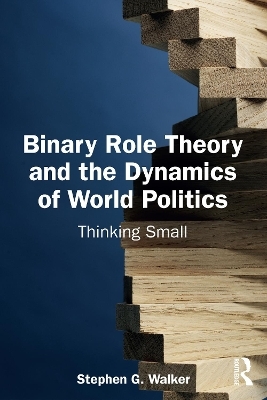
Binary Role Theory and the Dynamics of World Politics
Routledge (Verlag)
978-1-032-87356-5 (ISBN)
This book develops a binary role theory of world politics extending from the micro-analysis of foreign policy to the macro-analysis of world politics. The effort employs analytical tools outside of role theory to extend role concepts from agents spatially to finitely generated systems and temporally to different phases and sequences of social interaction between pairs of agents as ego and alter. There is an initial emphasis on “thinking small” about the interactions of agents as the building blocks of world politics and then tracing the processes of aggregation that generate the emergence and evolution of larger patterns of international relations over time.
Empirical case studies from different historical eras and geographical regions illustrate the application of binary role theory models to problems of conflict management, alliance formation, diplomatic engagement, and transitions in world order. The analysis employs complex adaptive systems (CAS) analysis to go beyond the study of political science in building bridges to the natural sciences by using concepts and models from the Standard Model in physics and the Modern Synthesis in biology. This book will interest an audience of foreign policy scholars and international relations theorists as well as students of quantum and computational models of world politics.
Stephen G. Walker is Professor Emeritus of Political Science in the School of Politics and Global Studies and Affiliated Faculty in the Future Security Initiative program at Arizona State University. He has published Role Theory and Foreign Policy Analysis (1987), Beliefs and Leadership in World Politics (2006), Rethinking Foreign Policy Analysis (2011), U.S. Presidents and Foreign Policy Mistakes (2011), Role Theory and the Cognitive Architecture of British Appeasement Decisions (2013), Role Theory and Role Conflict in U.S.–Iran Relations (2017), Operational Code Analysis and Foreign Policy Roles (2021) plus articles in several journals, including World Politics, the Journal of Conflict Resolution, the Journal of Peace Research, International Studies Quarterly, International Interactions, Foreign Policy Analysis, and Political Psychology. The National Science Foundation (1982–1983) funded his research on the belief systems and conflict management strategies of political leaders. He served as a coeditor of International Studies Quarterly (1985) and as a vice-president of the International Society of Political Psychology (1997–1999) and the International Studies Association (2003–2004). He received the Distinguished Scholar Award from the Foreign Policy Section of the International Studies Association in 2003. His recent public service includes serving at the National Academies of Science in 2013–2014 on the National Research Council’s Committee on US Air Force Strategic Deterrence Military Capabilities in the 21st Century Security Environment.
Preface Part I: Role Theory and World Politics 1. Binary Role Theory and Thinking Small 2. Particle Politics and Political Cosmology 3. Operational Code Analysis as Quantum Mechanics 4. Binary Role Theory and Quantum Politics Part II: Role Theory and Role Location Mechanisms 5. Adaptive Rationality and Mechanisms of Role Location 6. Predominant Leaders and Mechanisms of Role Strain 7. Single Groups and Mechanisms of Role Contestation 8. Coalitions and Mechanisms of Role Competition and Conflict Part III: Role Theory and the Sciences of the Artificial 9. Binary Role Theory as a Scientific Artifact 10. Role Adaptation and Role Transition. 11. Role Selection and Role Enactment 12. Roles and Rules in World Politics Part IV: Role Theory and World Order 13. Parts and Wholes in World Politics 14. Programming the Political Universe Appendices
| Erscheinungsdatum | 18.09.2024 |
|---|---|
| Zusatzinfo | 4 Tables, black and white; 81 Line drawings, black and white; 81 Illustrations, black and white |
| Verlagsort | London |
| Sprache | englisch |
| Maße | 152 x 229 mm |
| Gewicht | 620 g |
| Themenwelt | Sozialwissenschaften ► Politik / Verwaltung ► Europäische / Internationale Politik |
| Sozialwissenschaften ► Soziologie ► Empirische Sozialforschung | |
| ISBN-10 | 1-032-87356-6 / 1032873566 |
| ISBN-13 | 978-1-032-87356-5 / 9781032873565 |
| Zustand | Neuware |
| Haben Sie eine Frage zum Produkt? |
aus dem Bereich


